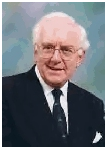An IAHPC Board Member’s Message:
From Derek Doyle …“dare I ask, could it be that we who teach palliative care give physical problems a higher profile than psychosocial and spiritual problems …?”

I have just read an excellent paper by Australian colleagues, looking at how GPs view and use specialist palliative care services (SPCs) ( 1). This is an important topic because GPs are crucially important in the provision of palliative care. Their self-assessments, as well as our learning how they choose SPCs, might assist us in audit and planning.
Referrals were prompted by the presence of a terminal illness, future need for symptom control, and uncontrolled physical symptoms. Reasons for not referring to SPC were the GP’s confidence in managing symptoms and the absence of physical symptoms. However, what struck me most was that referrals were primarily disease-related, seldom for psychosocial reasons and rarely for spiritual / existential suffering. The authors concluded, amongst other things, that measures are needed to encourage referrals based on psychosocial and spiritual needs as well as for physical concerns.
Perhaps these findings will not surprise many palliative care workers but I believe they pose important questions. Do GPs feel so competent in symptom management because it is relatively easy to learn, as well as to teach, or dare I ask, could it be that we who teach palliative care give physical problems a higher profile than psychosocial and spiritual problems which personally I found more difficult to teach?
Is it because the management of physical problems, particularly with our sophisticated pharmacological agents, is seen as ‘scientific’ and as a result has been far more studied, reported and dealt with? Are psychosocial and spiritual issues regarded as ‘soft’ – difficult to measure, difficult to replicate, of little interest to (or even scorned by) the newer recruits to specialist palliative medicine?
Do GPs, such as those in this study, see physical suffering meriting a higher priority and profile than spiritual issues in the SPCs where they refer patients? Are we teachers of palliative care not as confident talking about psychosocial and spiritual issues, or even slightly shy about it? Am I asking the wrong questions? Are we all being affected by the increasing secularisation of our society, reflected not only in diminishing church membership and attendances at worship, or in the actual laws against what is seen as proselytising? Readers in the UK will have read of several cases recently when GPs and Community Nurses have been charged and convicted of speaking of their own faith when not invited to do so by patients.
The paper which started me on this trail touched on so much more than I have mentioned here. It has reminded me how seldom, in teaching and demonstrating palliative care, do we review and evaluate our teaching; how little we know of the work and needs of those we teach – GPs, students, community nurses. We know from what so many have told us that they enjoy visiting the specialist palliative care services and their classes, but how scientific and useful are their written assessments of our teaching and our sharing of ourselves? There is so much research just waiting to be done.
Reference:
- Johnson CE, et al. Palliative care referral practices and perceptions. Palliative and Supportive Care (2011); 9, 181-189.
Dr. Doyle is a Lifetime Member of the IAHPC Board. He resides in Scotland and his bibliography may be found at http://www.hospicecare.com/Bio/d_doyle.htm | 
